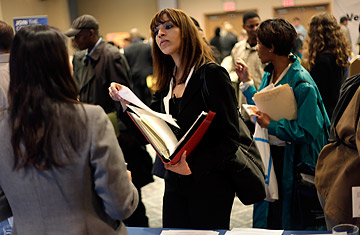
A woman talks to an employer at a job fair in New York on April 18, 2011
(2 of 2)
But advocates for the unemployed argue that in this economy there is no basis for negative inferences about people who are out of work. Many lost jobs for economic reasons or general corporate downsizing, not through any fault of their own. In a stronger job market, many would have found new jobs long ago.
These advocates also say that allowing companies to discriminate against the jobless is fundamentally unfair and threatens to condemn millions of Americans to permanent underclass status.
Unfair or bad policy, perhaps, but is it illegal? Federal civil rights laws do not protect the unemployed as a class, but some legal experts make a case that refusing to consider them for jobs is illegal. Policies that discriminate against jobless people, they argue, often discriminate against African Americans, Hispanics, Native Americans and disabled people — groups whose members are all more likely than average to be unemployed.
The Supreme Court has said that policies that appear to be neutral on their face can violate the Civil Rights Act of 1964 if they have a "disparate impact" on protected minority groups. But lawyers for employers claim that policies that discriminate against the unemployed do not have enough of a disproportionate impact on protected minorities to meet the high standard the Supreme Court has set for disparate-impact claims.
And they're probably right. Ending discrimination against the unemployed would most likely require new laws. In Congress, Representative Hank Johnson, a Georgia Democrat, has introduced the Fair Employment Act of 2011, which would amend the Civil Rights Act to make it illegal for employers to refuse to hire people simply because of their employment status.
In that respect, as in so many others, the states are starting to pull ahead of Washington. In March, New Jersey became the first state to adopt a law making it illegal to post job listings that make current employment a condition of applying or being hired. Several other states are considering similar laws.
Antidiscrimination law is tricky: there is no easy formula to determine which groups should be protected. As a nation, we have decided that race, sex, religion, national origin and disability should be protected classes, and we are getting there on sexual orientation.
Traditionally, the unemployed — who can, after all, give up membership in the group in an instant if they get a job offer — have not been regarded as a protected class. But as the Great Recession rages on and the plight of the long-term unemployed becomes more desperate, that may be about to change.
Cohen, a former TIME writer and a former member of the New York Times editorial board, is a lawyer who teaches at Yale Law School. Case Study, his legal column for TIME.com, appears every Monday.
